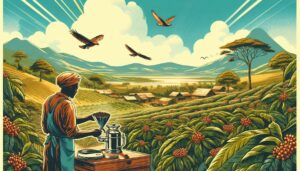Mention the word “EUDR” to coffee buyers and roasters in the EU in these last three months of 2024, chances are they might break into a sweat, the anxiety and stress becoming quite apparent.
At the very least, you will hear a concerned voice. As the deadline of 31 December 2024 approaches, the market is in quite a frenzy around EUDR.
If you have been scratching your head, wondering what’s happening, and would like to know why EUDR is the new Annabelle doll, read on.
“Regulation (EU) 2023/1115 of the European Parliament and of the Council of 31 May 2023 on the making available on the Union market and the export from the Union of certain commodities and products associated with deforestation & forest degradation and repealing Regulation EU No 995/2010”
This is the full title of the regulation passed and entered into force on 29 June 2023. This regulation’s passing repealed the earlier EU Timber Regulation and gave operators & traders 18 months to fall in line to follow the new regulation.
If that got too technical, allow us to simplify it.
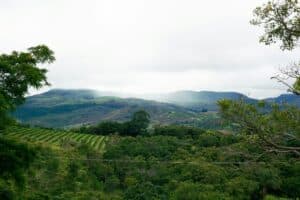
What is EUDR?
EUDR stands for EU Deforestation-free Regulation. This regulation aims to limit the EU’s market impact on global deforestation and forest degradation as well as biodiversity loss. In doing so, the EU aims to promote deforestation-free supply chains, reduce the EU’s contribution to greenhouse gas emissions, and protect human rights & the rights of indigenous people.
What products does EUDR apply to?
EUDR applies to –
- Timber/wood
- Rubber
- Palm oil
- Soy
- Beef
- Coffee
- Cacao
It also applies to products derived from these commodities like leather, chocolate, tyres, furniture, books, etc.
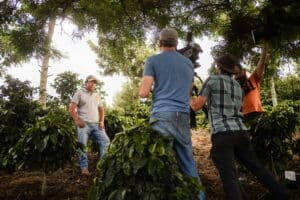
What does this mean for buyers in the EU?
The EUDR is a European legislation but its impact is going to be global. Companies buying or exporting the applicable products into or out of the EU will need to conduct extensive due diligence to confirm that the products have not been sourced from land that was deforested or degraded after 31 December 2020. Companies will also have to verify that these products are compliant with the relevant legislation of the country of production, including respect for human rights, and the rights of affected Indigenous Peoples.
Regulatory scrutiny is expected to be intense and companies taking steps to ensure sustainable, transparent, and deforestation-free supply chains will be better positioned to comply with the EUDR’s far-reaching requirements and grasp all the opportunities.
The due diligence has three parts:
- Information requirements: This includes the geolocation of all plots of land where the product was produced as well as information like contracts, court decisions, impact assessments, etc. that verify the product has been produced in compliance with the regulations of the country where it is produced. All operators are required to fulfill this requirement.
- Risk Assessment: If a product has originated in a ‘standard’ or ‘high-risk’ country, then operators would need to meet the second part of the due diligence. This requires information collected to be subjected to a thorough risk assessment.
- Risk Mitigation: This is the third part of the due diligence and its applicability would depend on the outcome of the risk assessment conducted in part 2. This would involve taking risk mitigation measures.
TL/DR: Without a due diligence statement confirming due diligence has been conducted with no risk of deforestation or non-compliance, products cannot be sold in, or exported from the EU market.
After December 2024, there will be no space for non-EUDR-compliant coffee in the EU and all lots can be potentially audited. You would need to provide all information, such as product details, CN code, quantity, country of production, geolocation coordinates of the plots of land where the product was produced, etc. in the due diligence statement that you have to submit via the Information System.
Am I an Operator or a Trader for the EUDR?
According to EUDR, an operator is someone who places the relevant products on the market or exports them. So, if you sell, give away, process, distribute to commercial or non-commercial consumers or use relevant products, you are an operator and you must submit a due diligence declaration.
A trader re-sells or distributes the relevant products without having previously placed them on the market.
Suppose you are a coffee company that imports and sells green beans from outside the EU, then you would be considered an operator. You are obligated to submit a due diligence statement based on information gathering, risk assessment, and if required, risk mitigation. This is mandatory for you.
Suppose you are a café in the EU that buys roasted beans from an EU-based roaster and sells them to consumers, you would qualify as a trader. You also need to submit a due diligence statement but you can refer to existing upstream due diligence statements (from the importers you bought coffee from) instead of carrying out your own risk assessment. However, you will still be legally liable for compliance and negligible risk conclusion.
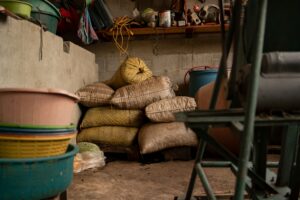
What should I tell the coffee producers I work with about EUDR?
Coffee producers who are not directly placing their coffee on the market (which they don’t unless they are importing, roasting, and selling it themselves), do not have any explicit obligations under the EUDR. But for businesses in the EUDR who buy the coffee to be compliant, the information would have to be shared by the producers and it would be they who will have to show that the coffee did not come from deforested land.
If producers cannot provide the relevant information that operators need, operators will not be able to import their coffee into the EU. The ultimate responsibility for compliance lies with the EU, they will be accountable for the accuracy of the data and its verification.
How do I collect the coordinates for the due diligence?
Traceability to the plot of land is necessary to demonstrate that there is no deforestation occurring in a specific location. This would require collecting geographic coordinates of plots of land where commodities were produced. These coordinates have to be provided in the due diligence statement that operators have to submit to the Information System before placing the products on the market or exporting them. Collecting geolocation coordinates can be done via mobile phones, handheld Global Navigation Satellite System (GNSS) devices as well as many free-to-use GIS applications that often don’t need mobile network coverage but solid GNSS signals like ones provided by Galileo.
If your producers have land of more than 4 hectares under cultivation, the geolocation has to be provided using polygons. This means the latitude and longitude points of six decimal digits to describe the perimeter of each plot of land. If producers have land of less than 4 Hectares, you can use a polygon or a single point of latitude and longitude of six decimal digits to provide the geolocation.
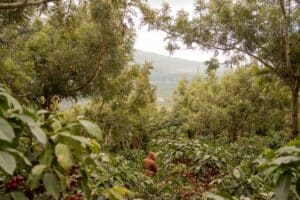
What if I bought non-compliant products or the due diligence data I provided is incorrect?
If you are found selling, trading, or importing non-compliant products, a fine of up to 4% of the company’s annual Union-wide turnover could be levied. If your producers are not compliant and you can’t prove it in your due diligence statements, their coffee cannot be brought into the EU. The importers, operators and traders could face bans for importing non-compliant products. All actors of the supply chain in the EU would be legally liable for non-compliance.
I am a coffee importer as well as a roaster, what should I do?
In this case, you likely qualify as both an operator as well as a trader. You must submit a due diligence statement for the imported coffee beans. You must also collect all relevant information and pass it on to other links in the supply chain or competent authorities when asked.
I only buy Rainforest Certified, Organic Certified, (and any other certified) coffees, do I need to do anything else for EUDR?
Yes, none of those certificates will help you be compliant with EUDR. You would need to carry out your own information gathering and risk assessment, fill out the due diligence statement, and submit it via the Information System. Even if your producers have all possible certifications, they would need to share all relevant information with you that you would need to verify to enable you to fill out your due diligence.
For how many years do I need to hold onto documentation pertaining to the products I buy/sell/trade/import?
Five years from the date of placing the product on the market or export.
I make blends in my roastery, some of my beans are from before the cut-off date and some are new, what should I do?
You would need to provide the due diligence statement for the beans purchased and sold after the cut-off date.
I buy coffee from some washing stations. Some of the farms are compliant and some are not, but all coffee gets mixed at the washing station. Will there be an exception for this?
No. All, once again, ALL coffee imported into the EU has to be compliant. If some portion of the import is non-compliant, either the lots have to be separated and not imported, or if it cannot be separated, the entire lot will be considered non-compliant and CANNOT be imported.
We use wood and recycled paper/paperboard for packaging, do we provide due diligence statements for that too?
If you sell packaging as a product, yes, you need to provide a due diligence statement for that and the material has to be compliant with EUDR. If you are using wood packaging to support, protect, or carry another product, say coffee bags, then it is not covered by EUDR and no separate due diligence statement is required for the same. Any user manuals you include in the packaging will also be exempt, unless the user manual has been purchased/sold separately as a product by itself.
So, if you are selling a limited edition coffee in a nice wooden box, the wooden box is not covered by EUDR. If you are selling wooden boxes to roasteries/cafes for their use, you have to meet compliance and submit the due diligence statement. If you sell an espresso machine and a user manual is included in the box, no due diligence statement is needed for it. But, if your customer buys a user manual separately for the roaster they bought from you, the user manual is a product and a due diligence statement is required for the same.
If you use recycled paper/paperboard that is made entirely from material that has completed its lifecycle and would otherwise have been discarded as waste, no obligation applies under EUDR. But, if the paper/paperboard has even the smallest percentage of virgin pulp, pre-consumed recycled paper, or non-recycled material, then it is subject to EUDR requirements.
In conclusion
The EUDR is a complex regulation and there is undoubtedly quite a frenzy in the market, which is only expected to get worse in the next few weeks. But if you read through the documents provided by the EU for the same, especially the FAQs, you can meet the compliances. Engage with the producers and stakeholders. Ask your buyers for information. Cross your Ts and dot your Is. The time to do it, is NOW, because tomorrow might be too late.



